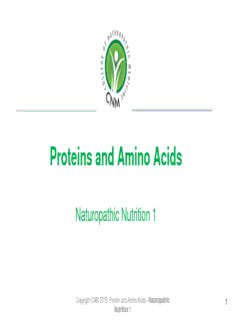
Proteins and Amino Acids PDF
Preview Proteins and Amino Acids
Proteins and Amino Acids Naturopathic Nutrition 1 Copyright CNM 2015: Protein and Amino Acids– Naturopathic 1 Nutrition 1 Learning Outcomes On successful completion you will be able to: • Outline the structure, functions, dietary sources and factors affecting the bioavailability of protein and amino acids and discuss their primary roles in metabolic physiological processes 2 Proteins - Structure Compounds containing C, H, O, N Building blocks - amino acids 3 Proteins - Structure Each amino acid contains: • Amino group – NH 3 • Carboxylic acid group - COOH • Unique side group which differentiates each amino acid - R group • Approx. 1000 AAs in nature (Lanham-New, Macdonald and Roche 2011) 4 Proteins - Structure • Several amino acids and their derivatives are important in metabolism, but generally not associated with protein • The human body commonly uses 20 amino acids for polypeptide synthesis -as building blocks of protein • More than half of the amino acids are considered nonessential, i.e. the body can synthesise them • There are nine amino acids that humans cannot synthesise either in sufficient quantities or at all, so they must be supplied with the diet; they are considered essential • Sometimes nonessential amino acids can become essential under specific circumstances, i.e. conditionally essential (Liska ed. 2004) 5 Proteins - Structure Some Non-Essential Essential Amino Acids Conditionally Essential Amino Acids Amino Acids Alanine Histidine Arginine Aspargine Isoleucine Cysteine Aspartic Acid Leucine Glutamine Citrulline Lysine Glycine Glutamic Acid Methionine Proline Proline Phenylalanine Tyrosine Serine Threonine Carnitine Selenocysteine Tryptophan Taurine Valine Ornithine 6 Proteins - Structure • Dipeptide - two amino acids • Tripeptide - three amino acids • Oligopeptide - several amino acids • Polypeptide - from 50 amino acids • Proteins - a few dozen to several hundred amino acids long 7 Proteins - Structure • Protein denaturation – occurs when proteins are subjected to heat, acid or other conditions that disturb their stability. This is accompanied by uncoiling of the protein/amino acid structure, loss of shape and loss of function, e.g. hardening of an egg when it is cooked 8 Proteins - Functions • The human body contains an estimated 10,000 to 50,000 different kinds of proteins • Each protein has a specific function that is determined during protein synthesis • In a normal weight person, protein accounts for about 17% of weight (12 kg in 70 kg man) 9 Proteins - Functions 10
Description: